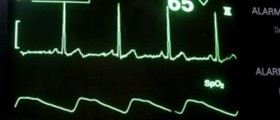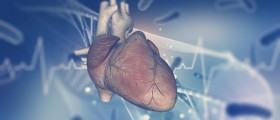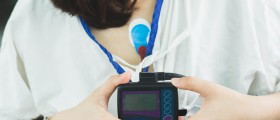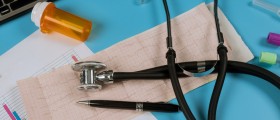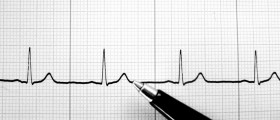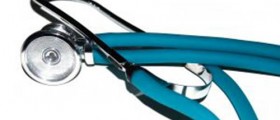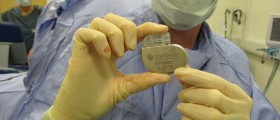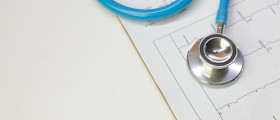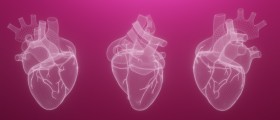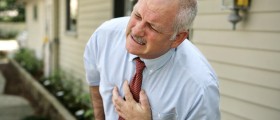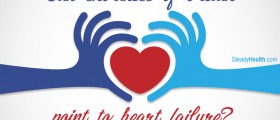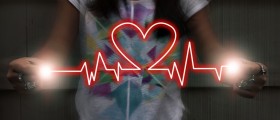I have heart palpitations when waking up from sleep in the last few months. It turns out it was caused by sleep apnea. I am currently using CPAP and my heart palpitation is getting much better.
Loading...
I have been experiencing fast heart beat when waking suddenly but I am sure the cause for mine is severe anxiety, I have suffered many years with symptoms of anxiety usually the odd pannic attack which passes but for the 2nd time i have been struck down with GAD generalised anxiety disorder but I am also getting the pannic attacks too! I have had many pannic attacks and know all the symptoms but each one is as scary as the next, my heart was beating so fast the other night I called 999 I was convinced I was going to have a heart attack and die, I was put on a ecg and everything was ok the paramedic said apart from normal wear and tear he said for my age Im 39 so I guess its not going to be as healthy as someone who is 20, which scared me as well? in face everything scares me at the moment ive got a pain in my head im dying I think its worse with anxiety, It makes your mind work overtime! The doctor prescribed me valium untill I can start some new anti d's. I thought that the pounding heart when waking was caused by the anxiety as Im constantly on edge, reading some of the replies I am certain that it is? It would not be too bad but when your waking 10+ times in the night with a pounding heart and all the other symptoms that go with pannic, its no jioke I can tell you. I sympathise with everyone who has experienced this.
Loading...
i get the same thing. when i dont sleep much. and i move around. and my body trys too settle down before i fall asleep. and when i do. my heart is beating fast. i go too sleep any ways because i am super tired. and i wake up. my in side mouth taste yucky. i am a little shaky. i look pale in some areas. my nose is stuffed. my head feels light headed. and my heart feels like its gonna beat out of my voice box. and its keeps pounding, and pounding realy fast. like i ran like a fast mile run.
its scarey when i wake up like that, i dont like that feeling. dr. g. said your heart isnt getting enough blood too pump through your vains and the heart its self. so its gonna pump faster too make it work. and if it doesnt work. your heart failes, then you die. and that is realy realy scarey. and your not getting enough oxygen in your brain. because your heart is trying too pump blood through your system. and put air, in your brain. thats why we feel light headed. and feel sick. and look PALE. The heart controls all your body and vains, and your brain. when your heart stops, so does every thing else. and its not fixable. the dr.s cant give you anything for it. so your heart is trying too work for you. and if it doesnt?. then you are a gonner.
your heart is the boss of your body, once it quit your gone. thats y it feels like your body is weird, because your heart is trying too get going.
you might of died in your sleep, and it came back pumping Fast, and Fast. God and his angels works weird ways sometimes. so love life, and enjoy if you wanna stay on his land. and dont argue, dont keep fighting, that couses more pumping *fast* too your heart. and get some sleep. and dont ever go to sleep if your heart is pumping fast. wait untile it slows down. if it doesnt . Go too the e.r. its scarey but if it doesnt slow down. go to the er.
and also do some yoga!. dont run dont jog. dont lay back down. please wait untile it slows down, and you feel all right. if anything stresses you out?.
get rid of it are dont go around it. are leave. go around your dog are cat. they well take care of you. they know whats wrong with you before you do. i went through it. and my lab was barking and going nutz jumping. and when i checked on her. she was looking at me too see if i was all right. and i went too her feeling, light headed still. she made me not move and she loved on me and gave me wet kisses. and i felt better. she keepted jumping too my chest. putting her paws on it. like are you ok.? are you ok?.
dont couse more stress too your heart please. its a number one heart attack. and dont argue, and dont fight. and drugs wont cure it either.
do yoga, are sit with your legs crossed , close your eyes and humm untile it goes away.i go through it alot. and the dr. just gave me medican too slow my heart down and make my light headed go away. it work i felt alot better. but he still cant cure a heart attack. i thought i was gonna too have one, a few times.
and yes STRESS...Not enough SLEEP. ARGUEING..well make your HEART......JUMPY!...so please please be care full. and can do it too small children too..as much as you yell at them. are abuse them are molest them. they a:-) .
Loading...
i just woke up and i noticed that my heart was beating like over 200 bpm. but i was not sweating, no chest pains, and my breathing was very normal. i didn't feel a thing, my heart wasn't even beating hard, i couldn't feel it in my chest. i only felt it when i took my pulse. i didn't count the beats, but i know it was over 200bpm. it lasted for 30-90 seconds...
I had the same thing. Like the above poster said. I could not feel my heart beating in my cheat at all, but on my pillow I could hear my heart beating very very fast.
I don't know what it is, but after reading some of these posts , it doesn't scare me as much. I was playing a video game late last night, and went to bed really late.
Loading...
* When your heart is beating too fast, your blood may not be able to move well through your body. This may cause you to feel dizzy, short of breath, or sick to your stomach during episodes of SVT. Some people feel fine during SVT episodes. Problems caused by your SVT may depend on many things. These include how long the SVT lasts, what is causing it, how fast your heart beats, and your general health.
What causes SVT?
* Your heart has a special electrical system that controls your heartbeat. Your SVT may be caused by a problem with this electrical system in the heart muscle. You may have been born with this problem, or it may be caused by something else. Your SVT could be caused by a heart condition such as a valve problem or blocked arteries (blood vessels). The risk of SVT is increased after heart surgery. Thyroid disease or heart failure may also cause SVT. Low blood pressure from bleeding or dehydration (dee-heye-DRAY-shen), or having anemia (ah-NEE-mee-uh) may cause SVT. Using illegal drugs, such as "speed" or cocaine, can cause SVT and other heart problems.
* Certain medicines, such as weight loss or cold and allergy medicines, may cause your SVT to start. Medicine used to treat certain thyroid problems may cause SVT if you take too much. Some herbs (such as ma huang) and diet supplements that have ephedra can cause SVT. Exercise, fever, stress, or being upset may also trigger an SVT episode. Other things that can trigger an SVT attack include smoking, drinking too much alcohol, and caffeine. Caffeine is found in coffee, chocolate, and some soft drinks and teas. You may notice that your SVT starts after sudden position changes, such as bending over too fast. Some women have SVT that starts or becomes worse during pregnancy.
What are the signs and symptoms of SVT? Some people have no symptoms during an SVT episode. If you do have symptoms, they may include:
* A heartbeat that you suddenly notice and that feels different than normal (heart palpitations). It may feel like a thumping in your chest. You may feel like your heart is fluttering, racing, or having extra beats.
* Feeling more tired, weak, or short of breath than usual.
* Feeling lightheaded or dizzy. You may feel like you have increased pressure in your head. You may even faint (pass out).
* Having pain, pressure, or tightness in your chest, neck, jaw, arms, or upper back.
* Feeling sick to your stomach (nauseated).
* Feeling anxious, scared, or worried that something bad may happen.
How is SVT diagnosed? It can be hard for your caregiver to find out what is causing your symptoms. Often, by the time you see a caregiver, your SVT may have stopped. Caregivers have a better chance of finding out what is wrong if you are seen when your SVT is happening. Your caregiver will review your medical history and any symptoms you have. Your caregiver will examine you, and listen to your heart and lungs with a stethoscope (STETH-oh-skohp). Other things that may be done include:
* Tests on your blood and urine to look for possible causes of your SVT.
* An EKG may be done to look for problems or damage in different areas of the heart. You may be asked to exercise while hooked up to an EKG machine. This is called an exercise stress test. You may need to wear a portable heart monitor at home for a short time.
* A chest x-ray to check your heart and lungs.
* An ultrasound of your heart called an echocardiogram (ek-o-KAHR-de-o-gram). An echocardiogram can find problems with your heart that do not show up on an EKG or in an x-ray.
* If you have problems with fainting, you may need a tilt table test. This test checks to see what happens to your heart and your blood pressure when you change positions.
* If your SVT is not helped by medicine, you may need an electrophysiology (ee-lek-troh-fiz-ee-OL-oh-jee) study. This test is used to "map out" the electrical pathways in your heart that control your heartbeat. Readings are taken through small wires that are fed through a blood vessel in your arm or groin to your heart. Your doctor can also use these wires to trigger your SVT and find the best way to treat it.
How is SVT treated? How your SVT is treated may depend on what is causing it, your symptoms, and other health problems you may have. If your SVT causes few symptoms and you are healthy, you may not need any treatment. You may need to make lifestyle changes, such as decreasing stress and avoiding alcohol and caffeine. If your symptoms bother you or you have other health problems, your SVT may need further treatment. Treatments may include one of more of the following:
* Vagal maneuvers: If caregivers are with you during your SVT episode, they may try vagal (VAY-gal) maneuvers. Vagal maneuvers use your own body to try and get your heart rate to slow down. Caregivers may have you cough, bear down like you are having a BM, or put your face in ice water. Caregivers may even teach you how to do vagal maneuvers so you can do them yourself at home.
* Carotid sinus massage: Caregivers may massage your neck to try and slow your heart rate. This is called a carotid (kah-ROT-id) sinus massage. Never try to do a carotid sinus massage on yourself or anyone else.
* Heart medicines: Long-term medicines may be given to keep your SVT from coming back, or to help symptoms.
* Chemical cardioversion: Short-term medicines may be given to change your heart rate or rhythm. This is called a chemical cardioversion (KAHR-dee-oh-ver-zhun). You may need a chemical cardioversion more than once.
* Electrical cardioversion: If you are having bad symptoms during an SVT episode, you may need an electrical cardioversion. This is a procedure where an electric shock is given to the heart. The shock is usually given through paddles or sticky patches placed on your chest or back. The shock helps your heart return to a normal beat. You may need this more than once.
* Ablation: If your SVT causes problems and medicines do not help, you may need an ablation (ab-LAY-shun). This is a procedure where small wires are fed through a blood vessel in your arm or groin to your heart. Your doctor finds the area of the heart muscle causing the electrical impulse problem. Heat energy is applied to the area to stop the abnormal impulses. An ablation may keep your SVT from coming back forever.
Risks: In most people, SVT is not dangerous. However, it is important to be seen by a caregiver if you have new or worsening symptoms. Without treatment, you could have more SVT episodes. Some heart rhythms that are left untreated can increase your chance of heart failure or a heart attack. Rarely, SVT may be serious, even life threatening. Call your caregiver if you are worried or have questions about your medicine or care.
Loading...
Loading...
Loading...
I know this is kinda late, but I just wanted to chime in. I realize that many people suffer from arrythmias and palpitations from time to time, but if you are worried or feel that something is wrong, going to the hospital to have it checked out isn't going to do you any harm.
I'm 20 years old. I'm not a smoker, nor do I drink. About 3 months ago, I woke up one morning, and as I was lying in bed, my heart began pounding against my chest so fast that I realized something wasn't right. I stood up, but immediately felt like I had lost my breath. I suffer from generalized anxiety disorder, and thought that maybe I was just having a panic attack. I tried to sit down and take a few deep breaths, though nothing helped, and I began feeling tingles (as if my body was asleep).
I went downstairs and woke my mother up, even though it was about 5 to 6 in the morning. I made her feel my heart, though she told me to just sit down on the couch and try and relax. Looking it up online, we ended up going to the hospital. The ER is only about 7 minutes away from my house, but on the ride, my entire body began tingling and I could barely breathe--I was hyperventilating and almost to the point of tears. I literally thought I was dying.
At the hospital, they assumed it was a panic attack, though did an EKG just in case. As soon as the cardiologist looked at the EKG, they rushed me into the back and immediately put me on an IV in hopes of slowing my heart rate down. My heart was going from 140 to 220--I was experiencing a really terrible arrythmia.
After about 30 minutes on the IV, my heart wasn't returning to normal rate or rhythm. They told me they'd need to get the anesthesiologists so they could put me under in order to do a defibrillation (y'know, when they get the pads and shock your heart back into natural rhythm).
The doctor wandered across the hall to ring the anesthesiologists, but my heart went back to 200, and I kid you not, they put a little numbing medication into my IV, put the pads on my chest and shocked me while I was conscious. My heart immediately felt as if it had stopped a moment before it went from 200 to 90. It was the most terrifying experience of my life.
They kept me in the hospital, and the next morning, I had an EP study (electrophysiology study)--basically, it's a catheder they put into your groin and slip it into your heart with a camera attached so they can check if there are any irregularities. After they found nothing, they decided it was a "freak episode" that they could only hope it wouldn't happen again. I was in the hospital for 3 days before they let me go home. I'm not on heart medication to keep my heart from racing, though I still experience tachycardia.
Please, if you believe something is wrong, you are the only one who knows your body. While tachycardia and atrial fibrillation is not immediately dangerous, it is still nothing to shrug off. My doctors told me that eventually, your heart gets tired from attempting to beat correctly (when in reality, its just quivering quickly and not capable of sending enough blood through the body), and the lack of blood circulating causes you to eventually pass out. Its not something to mess with, seriously.
Loading...
I have a fast heart rate sometimes when I wake in the morning. It doesn't happen very often. Not even once a week. It happened today when I had to get up early. I woke up to my alarm and I went back to sleep. When I woke up again, I realized I had only about 25 min to get ready and be at work. I jumped out of bed and my heart rate shot way up. I was too scared to check exactly how fast. It took about 30 min to go back to normal and it may have helped that I took a low dose valium type pill I got from my Dr. Normally when this happens I feel no pain but I can feel my heart beating too fast. Today I have this dull ache under my left arm and it feels like under the upper part of my shoulder blade, but up above my heart. I once had a nurse tell me that if the pain is above your breast then it's not your heart. I also went to bed hungry with a little heartburn and slept badly. I feel like it might be a combination of gas/indigestion/anxiety. Aside from when I am jolted awake, the only other time I've had this is when I had acid reflux really badly. I went to the ER and had an echo done and everything was fine. That was a couple of years ago, though. My blood pressure is consistantly 110/80 when I go to the dr. When I exercise regularly, it's 110/70. The only other issues I have is migraines and I take sumatriptin for that and gallstones which I take nothing for as I control what I eat and seldom have attacks. I really feel like this is anxiety. Next time I go to the Dr. I will ask what he thinks. He'll prob give me more meds.
Loading...
Waking up with fast heart beat could be caused by sleep apnea. I had that happened to me a couple years ago. I am using CPAP now and the symptom is done.
Loading...
I have been experiencing the same thing, something I have wondered is if it could be partially attributed to my asthma medication, as I previously took Advair and now take Flovent which is very similar. They can have gnarly side effects on your body and heart, including palpitations. I have been experiencing the same thing for at least a few years now, but last night was one of my worst. It kept me up all night, and I swore I felt a slight tingling throughout my body. Even today I haven't been able to get a nap in, but I think thats because I am so nervous about it happening again. I also have had troubles with anxiety disorders in the past, so mine could easily be attributed to that too.
Just thought I'd mention it since no one had commented on the medications.
Loading...
I had this problem too after having dehydration and I kept having it after waking up usually to go to the bathroom. I had all heart tests done and everything came back normal. My doctor started me on Lexapro 5 mg and a beta blocker 37 mg at bed time and it has really helped. I also add a 1/2 of a 5 mg of valium at night. No need to have rapid heartbeats as mine was due to stress and anxiety. Medication can be give to help you as there is no need to suffer with such!
Loading...



